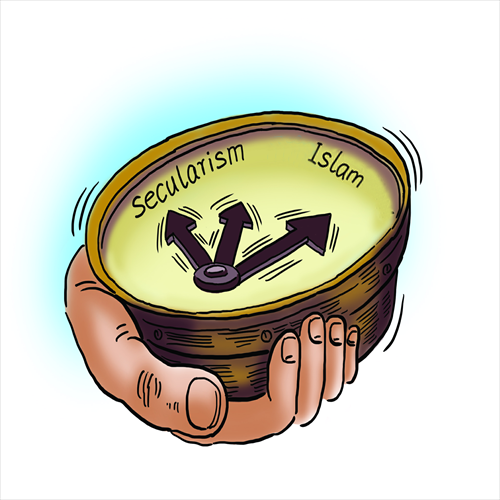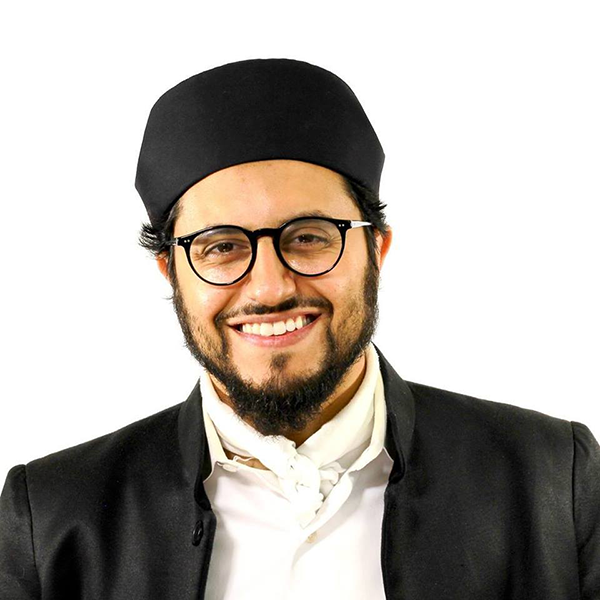



 Tahir Mahmoud
Tahir MahmoudDiscussing the topic of soft power, emergence of a new multipolar world as well as Muslim resurgence with a policy adviser from an influential Muslim country, led to a sharp remark from our interlocutor that must be considered seriously.
The official framed the issue of Muslim resurgence starkly,
The comeback of the Muslim world is an illusion induced by the fact that the Middle East and North Africa has once again stolen the limelight as the hotbed of barbarism. Though, I do not believe Muslims are the only ones to blame for the carnage, the suggestion that we are on the rise is pretty flimsy. On what measure are we on the rise? What benchmarks attest to it? I think there are none. Think about it. Not a single barometer of economy shows it.

When responding to the remark about the rise of the Muslim world and its soft power we will not list the well-known external (NATO) causes behind the dire situation in the Muslim world, which our interlocutor knows well. We will also not aim to conduct an in-depth analysis of the vast available data to push our perspective. This is the work for larger institutions with heavy wallets.
We would like to focus on assessing a realistic potential of Muslims within the new emerging multipolar world and we recommend that our readers check out the embedded hyperlinks to examine the data from which we have deduced our perspective.
Prior to formulating our response, the two competing paradigms, Islam and secular-liberalism need to be properly qualified. In order not to reinvent the wheel, let us quote Dr. Shadee Elmasry,
Embedded in every value statement is a belief system. And every belief system produces its own terminology, which reflects its values. In the most successful secular religion of our generation — liberalism — you will find the following words pop out regularly as the measuring sticks of goodness: egalitarianism, equality, democratic, individualism, tolerance, freedom, diversity.
Go to Communism and you’ll find a whole set of other terms. Shift to spiritual religions and they have their own terms. When you commit to a belief system, you adopt those value terms and try to live by them and see everything through those lenses. You don’t take another set of terms and try to fit your religion into them. In Islam, where everything revolves around the will of the Maker, terms look like iman (commitment to Allah), ikhlas (sincerity), ri∂allah (the pleasure of Allah), ja’iz (accepted by Allah), muharram (prohibited by Allah), far∂ (obligated by Allah), Sunnah (done by the Prophet – r), ummah (the community of committed Muslims)… and many more.
Note that the above list revolves around the individual and society. The latter list revolves around Allah and the Messenger first, and then individual and society. Big difference.
…If you notice: it’s the weaker group that always uses the stronger group’s terminology. You’ll never see a Western liberal academic using a framework of “permissible vs. prohibited.” To conclude, if you enter into a discussion where the terms derive from some other system, you will lose and end up looking dumb 100% of the time (Socrates said, “I won every debate I ever had because I first made sure my opponent was using my terms”).

Therefore, if anyone wishes to assess the potential of Muslims in terms of soft power, doing so only by adopting the secular-liberal benchmarks, which are full of default secular philosophical presuppositions, is fruitless, as the Islamic paradigm is significantly different from the materialistic one dominating the contemporary world.
The decline of the United States has opened an opportunity for powerful nation-states like China, Russia, Germany, Japan, etc, to take their own place in the realm of global politics and reshape the world order. While these nations possess a great deal of hard power, which most nations through hard work can achieve, most of them experience a significant deficiency in terms of soft power. China’s recent most memorable soft-power “coup” was a Panda. In essence, they all aim to repackage the liberal-Hollywood worldview for their domestic audiences. There is very little indigenous substance to their soft power.
Russia and China for example are powerful alternatives to the US global military hegemony; yet, the role model of their youth is a teenager in New York. The trendy youth in LA is not trying to imitate youngsters in Beijing or Moscow. Success and failure in life is defined through the prism of Hollywood, not the Orthodox Church, Dostoyevsky, or Confucianism. All so-called alternative powers to US global hegemony lack their own paradigm. They are not supranational; Islam is. Islam offers its own paradigm of what soft power is and a concrete methodology and strategy of its vision rooted in spirituality and God-consciousness (taqwa).
Examining the soft power aspect of the Islamic Revolution in Iran, an Iranian scholar, Dr. Yadollah Mohammadi states, “Changing or structuring the mindset of individuals or creating unreal objectivities by means of the media forms the bedrock of the colonialist’s new domination and shapes its cultural hegemony.”
True, Western powers by skillfully reinforcing their intellectual narrative with economic, political, and military power, managed to forcefully export their din/lifestyle (liberalism and secularism) to Muslim societies. Yet, taking into account the multimillion dollar Islamophobia industry and the absence of sophisticated organizations due to lack of genuine state backing, Muslims are managing to create a flood of converts to Islam, thus “co-opting” hundreds of thousands of Westerners out of the so-called highly civilized lifestyles into the “backward” religiosity of “backward” people. There must be something powerful and highly appealing about Islam and Muslims that the so-called sophisticated Westerners are finding amongst “backward” Muslims.
Islamophobes and Zionists try to dismiss this phenomenon through longing for identity, but this is a primitive cynicism of a losing team. Even if one accepts their argument as valid, it simply means that the civilization of skyscrapers, McDonalds, hyper-sexuality, social media, and scientific agnosticism is failing to provide its adherents with basic elements of identity and they are forced to take it from the “backward” people.
Another evident reality is that Islamic socio-political movements in the Muslim world have performed far better through popular vote than any other socio-political movement. The point to keep in mind when considering this is the fact that non-Islamic socio-political movements are almost always backed by powerful external forces. Yet, from millions of demonstrators in Iran in 1979 calling for an Islamic governing system, to millions of Algerians casting their votes for the Islamic Salvation Front (FIS) in 1991, to the Muslim Brotherhood’s outright electoral victory in Egypt in 2011 and to the August 2017 gains of the the National Alliance for Reform in Jordan’s municipal elections, Muslims primarily appeal to Islamic socio-political movements for solutions.
Secular policy centers try to dismiss the evident electoral achievements of Islamic movements over the past decades by studying the power of the Islamic movements through the perspective of secular party politics. It is enough to note that in Iraq, Ayatullah Sayyid ‘Ali Sistani is not a member of any political party, but he has more authority, power, and influence than all Iraqi secular parties put together. A similar statement would also apply to high-level Hamas officials who while being members of the movement in Palestine enjoy more popular support and influence in the wider Arab world than any US-backed ruler in the region.
In general, applying secular perspectives, derived from the Western notions of party politics, on measuring the power of the Islamic movements will not produce accurate results. It would be like trying to understand Buddhism by referring to the Bible.
Western economies are not doing well. This can be observed not only through research papers or analytical policy articles, but by heading to Dubai, Doha, Kuala Lumpur, and having a small talk with armies of Western expatriate workers of various professions who chose for economic and social reasons, to migrate from London, Sydney, New York, or Auckland. The entire economic paradigm which propelled Western liberalism to the peak is seriously debated.
We do not claim that a single Muslim country will be the new cultural or political substitute for the US or a global hegemon in the next 10–20 years. Even though Washington’s imperial decline is clearly visible, it will still take time, as there is no organized power to replace it right away in many crucial fields. However, the new nature of the multipolar world order will be unique due to technological aspects and the speed of communication available today. Thus, surprises should be expected.
Within this dynamic, flexible, and multi-tier world order Muslims will be one of the power centers whose narrative and interests others will have to take into account. One should not underestimate the people who initiated the collapse of the Soviet Union after its defeat in Afghanistan and Washington’s decline after its aggression against Iraq.
The enforcement mechanism of Muslim interests and ambitions will depend on the skillful combination of hard power with Islamic principles and the Islamic paradigm of soft power. Of course, this will take some time for Muslim governments and nation-states to master, but the collapse of the existing world order is opening a window of opportunity for Muslims to put forward their own narrative.
In 2011, the Newscientist reported that Iran’s scientific output rose 18-fold between 1996 and 2008, from 736 published papers to 13,238. The same report also showed,
…the UK’s Royal Society, comparing global publication and citation rates between 1993 and 2003 with those between 2004 and 2008. Like Iran, other, smaller players are also stepping up their research activity. Turkey, for example, quadrupled its output between 1996 and 2008, after increasing sixfold its funding for R&D. Similar trends emerged in Tunisia, Singapore, and Qatar.
The above data is one of many demonstrating that the Muslim world is catching up in terms of hard power, but hard power is not the most pivotal factor in 1438ah (2017); it is soft power.
Islam managed to expand worldwide in a very short period of time, umatched in human history. Today Islam is growing within diverse societies because of its principled core. Over centuries, the core of Islam’s beliefs has proven to be immune to co-option and it managed to maintain a logical and spiritual link of its core to its flexible and dynamic laws and regulations.
In short, Islam has a proven capacity to do what coffee does to hot water. This is a capability no other state and non-state entity in the new emerging multipolar world order has. They all dream about it, but for metaphysical reasons will not be able to attain.
